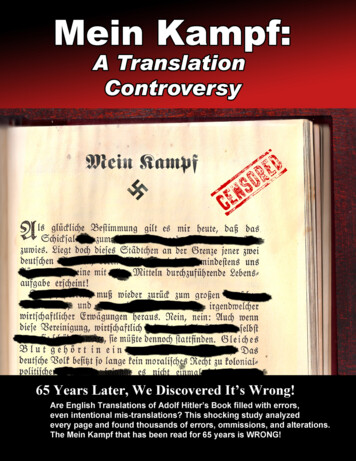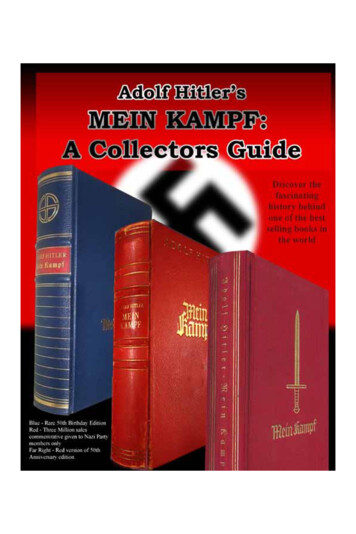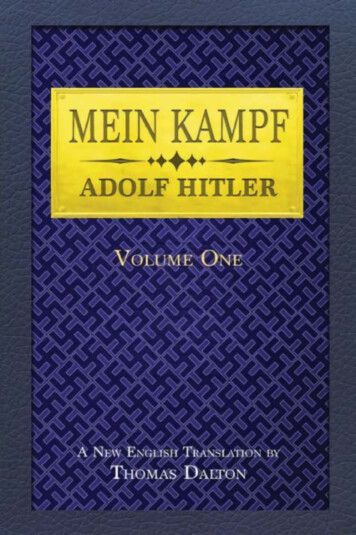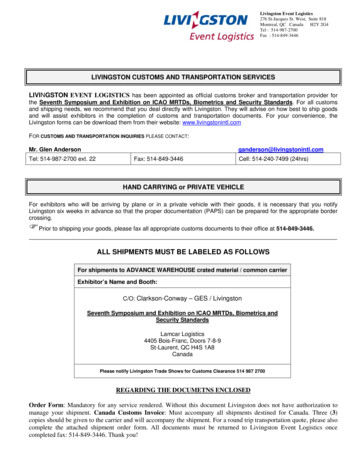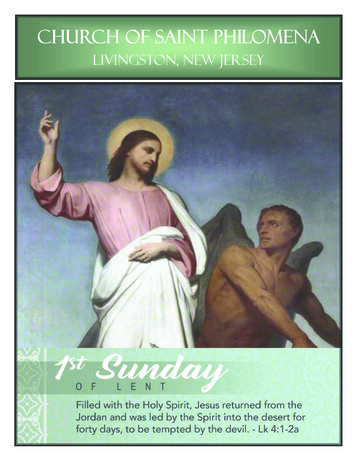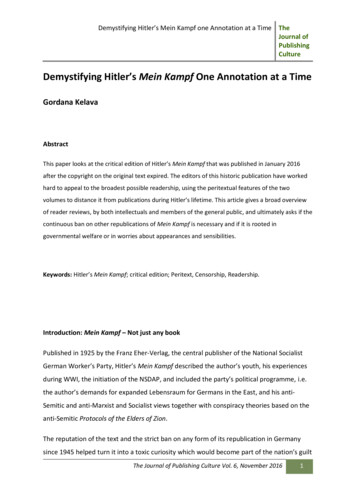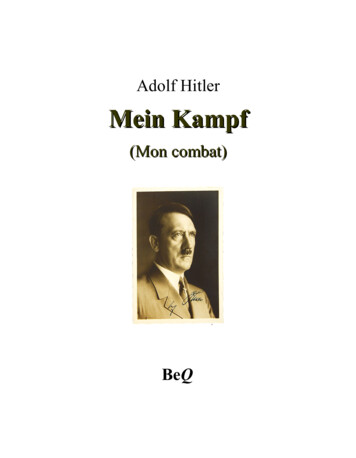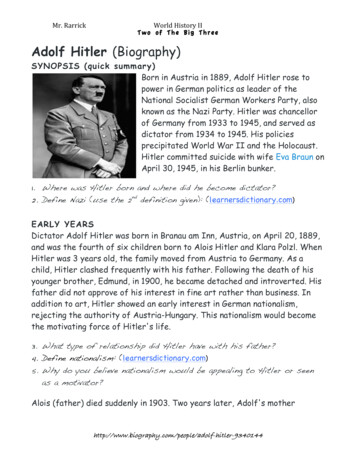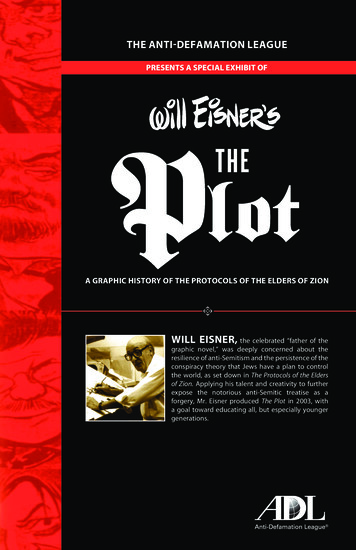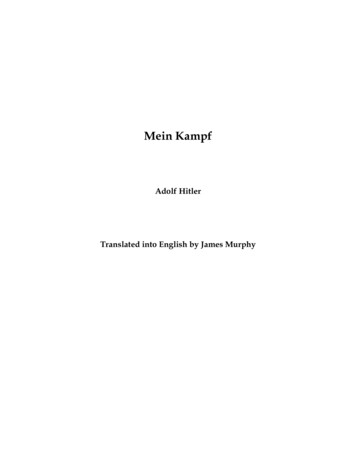
Transcription
Mein KampfAdolf HitlerTranslated into English by James Murphy
Author's IntroductionON APRIL 1st, 1924, I began to serve my sentence of detention in the Fortress ofLandsberg am Lech, following the verdict of the Munich People's Court of that time.After years of uninterrupted labour it was now possible for the first time to begin awork which many had asked for and which I myself felt would be profitable for theMovement. So I decided to devote two volumes to a description not only of the aims ofour Movement but also of its development. There is more to be learned from this thanfrom any purely doctrinaire treatise.This has also given me the opportunity of describing my own development in so far assuch a description is necessary to the understanding of the first as well as the secondvolume and to destroy the legendary fabrications which the Jewish Press havecirculated about me.In this work I turn not to strangers but to those followers of the Movement whosehearts belong to it and who wish to study it more profoundly. I know that fewer peopleare won over by the written word than by the spoken word and that every greatmovement on this earth owes its growth to great speakers and not to great writers.Nevertheless, in order to produce more equality and uniformity in the defence of anydoctrine, its fundamental principles must be committed to writing. May these twovolumes therefore serve as the building stones which I contribute to the joint work.The Fortress, Landsberg am Lech.At half-past twelve in the afternoon of November 9th, 1923, those whose names aregiven below fell in front of the FELDHERRNHALLE and in the forecourt of the formerWar Ministry in Munich for their loyal faith in the resurrection of their people: Alfarth, Felix, Merchant, born July 5th, 1901Bauriedl, Andreas, Hatmaker, born May 4th, 1879Casella, Theodor, Bank Official, born August 8th, 1900Ehrlich, Wilhelm, Bank Official, born August 19th, 1894Faust, Martin, Bank Official, born January 27th, 1901
Hechenberger, Anton, Locksmith, born September 28th, 1902Koerner, Oskar, Merchant, born January 4th, 1875Kuhn, Karl, Head Waiter, born July 25th, 1897Laforce, Karl, Student of Engineering, born October 28th, 1904Neubauer, Kurt, Waiter, born March 27th, 1899Pape, Claus von, Merchant, born August 16th, 1904Pfordten, Theodor von der, Councillor to the Superior Provincial Court, bornMay 14th, 1873Rickmers, Johann, retired Cavalry Captain, born May 7th, 1881Scheubner-Richter, Max Erwin von, Dr. of Engineering, born January 9th, 1884Stransky, Lorenz Ritter von, Engineer, born March 14th, 1899Wolf, Wilhelm, Merchant, born October 19th, 1898So-called national officials refused to allow the dead heroes a common burial. So Idedicate the first volume of this work to them as a common memorial, that the memoryof those martyrs may be a permanent source of light for the followers of our Movement.The Fortress, Landsberg a/L.,October 16th, 1924
Translator's IntroductionIN PLACING before the reader this unabridged translation of Adolf Hitler's book,MEIN KAMPF, I feel it my duty to call attention to certain historical facts which mustbe borne in mind if the reader would form a fair judgment of what is written in thisextraordinary work.The first volume of MEIN KAMPF was written while the author was imprisoned in aBavarian fortress. How did he get there and why? The answer to that question isimportant, because the book deals with the events which brought the author into thisplight and because he wrote under the emotional stress caused by the historicalhappenings of the time. It was the hour of Germany's deepest humiliation, somewhatparallel to that of a little over a century before, when Napoleon had dismembered theold German Empire and French soldiers occupied almost the whole of Germany.In the beginning of 1923 the French invaded Germany, occupied the Ruhr district andseized several German towns in the Rhineland. This was a flagrant breach ofinternational law and was protested against by every section of British political opinionat that time. The Germans could not effectively defend themselves, as they had beenalready disarmed under the provisions of the Versailles Treaty. To make the situationmore fraught with disaster for Germany, and therefore more appalling in its prospect,the French carried on an intensive propaganda for the separation of the Rhineland fromthe German Republic and the establishment of an independent Rhenania. Money waspoured out lavishly to bribe agitators to carry on this work, and some of the mostinsidious elements of the German population became active in the pay of the invader.At the same time a vigorous movement was being carried on in Bavaria for thesecession of that country and the establishment of an independent Catholic monarchythere, under vassalage to France, as Napoleon had done when he made Maximilian thefirst King of Bavaria in 1805.The separatist movement in the Rhineland went so far that some leading Germanpoliticians came out in favour of it, suggesting that if the Rhineland were thus ceded itmight be possible for the German Republic to strike a bargain with the French in regardto Reparations. But in Bavaria the movement went even farther. And it was more farreaching in its implications; for, if an independent Catholic monarchy could be set up inBavaria, the next move would have been a union with Catholic German-Austria.possibly under a Habsburg King. Thus a Catholic BLOC would have been created
which would extend from the Rhineland through Bavaria and Austria into the DanubeValley and would have been at least under the moral and military, if not the fullpolitical, hegemony of France. The dream seems fantastic now, but it was consideredquite a practical thing in those fantastic times. The effect of putting such a plan intoaction would have meant the complete dismemberment of Germany; and that is whatFrench diplomacy aimed at. Of course such an aim no longer exists. And I should notrecall what must now seem "old, unhappy, far-off things" to the modern generation,were it not that they were very near and actual at the time MEIN KAMPF was writtenand were more unhappy then than we can even imagine now.By the autumn of 1923 the separatist movement in Bavaria was on the point ofbecoming an accomplished fact. General von Lossow, the Bavarian chief of theREICHSWEHR no longer took orders from Berlin. The flag of the German Republic wasrarely to be seen. Finally, the Bavarian Prime Minister decided to proclaim anindependent Bavaria and its secession from the German Republic. This was to havetaken place on the eve of the Fifth Anniversary of the establishment of the GermanRepublic (November 9th, 1918.)Hitler staged a counter-stroke. For several days he had been mobilizing his stormbattalions in the neighbourhood of Munich, intending to make a national demonstrationand hoping that the REICHSWEHR would stand by him to prevent secession.Ludendorff was with him. And he thought that the prestige of the great GermanCommander in the World War would be sufficient to win the allegiance of theprofessional army.A meeting had been announced to take place in the Bürgerbräu Keller on the night ofNovember 8th. The Bavarian patriotic societies were gathered there, and the PrimeMinister, Dr. von Kahr, started to read his official PRONUNCIAMENTO, whichpractically amounted to a proclamation of Bavarian independence and secession fromthe Republic. While von Kahr was speaking Hitler entered the hall, followed byLudendorff. And the meeting was broken up.Next day the Nazi battalions took the street for the purpose of making a massdemonstration in favour of national union. They marched in massed formation, led byHitler and Ludendorff. As they reached one of the central squares of the city the armyopened fire on them. Sixteen of the marchers were instantly killed, and two died of theirwounds in the local barracks of the REICHSWEHR. Several others were wounded also.Hitler fell on the pavement and broke a collar-bone. Ludendorff marched straight up tothe soldiers who were firing from the barricade, but not a man dared draw a trigger onhis old Commander.Hitler was arrested with several of his comrades and imprisoned in the fortress ofLandsberg on the River Lech. On February 26th, 1924, he was brought to trial before the
VOLKSGERICHT, or People's Court in Munich. He was sentenced to detention in afortress for five years. With several companions, who had been also sentenced tovarious periods of imprisonment, he returned to Landsberg am Lech and remainedthere until the 20th of the following December, when he was released. In all he spentabout thirteen months in prison. It was during this period that he wrote the first volumeof MEIN KAMPF.If we bear all this in mind we can account for the emotional stress under which MEINKAMPF was written. Hitler was naturally incensed against the Bavarian governmentauthorities, against the footling patriotic societies who were pawns in the French game,though often unconsciously so, and of course against the French. That he should writeharshly of the French was only natural in the circumstances. At that time there was noexaggeration whatsoever in calling France the implacable and mortal enemy ofGermany. Such language was being used by even the pacifists themselves, not only inGermany but abroad. And even though the second volume of MEIN KAMPF waswritten after Hitler's release from prison and was published after the French had left theRuhr, the tramp of the invading armies still echoed in German ears, and the terribleravages that had been wrought in the industrial and financial life of Germany, as aconsequence of the French invasion, had plunged the country into a state of social andeconomic chaos. In France itself the franc fell to fifty per cent of its previous value.Indeed, the whole of Europe had been brought to the brink of ruin, following theFrench invasion of the Ruhr and Rhineland.But, as those things belong to the limbo of a dead past that nobody wishes to haveremembered now, it is often asked: Why doesn't Hitler revise MEIN KAMPF? Theanswer, as I think, which would immediately come into the mind of an impartial criticis that MEIN KAMPF is an historical document which bears the imprint of its own time.To revise it would involve taking it out of its historical context. Moreover Hitler hasdeclared that his acts and public statements constitute a partial revision of his book andare to be taken as such. This refers especially to the statements in MEIN KAMPFregarding France and those German kinsfolk that have not yet been incorporated in theREICH. On behalf of Germany he has definitely acknowledged the German portion ofSouth Tyrol as permanently belonging to Italy and, in regard to France, he has againand again declared that no grounds now exist for a conflict of political interests betweenGermany and France and that Germany has no territorial claims against France. Finally,I may note here that Hitler has also declared that, as he was only a political leader andnot yet a statesman in a position of official responsibility, when he wrote this book,what he stated in MEIN KAMPF does not implicate him as Chancellor of the REICH.I now come to some references in the text which are frequently recurring and whichmay not always be clear to every reader. For instance, Hitler speaks indiscriminately ofthe German REICH. Sometimes he means to refer to the first REICH, or Empire, andsometimes to the German Empire as founded under William I in 1871. Incidentally the
regime which he inaugurated in 1933 is generally known as the THIRD REICH, thoughthis expression is not used in MEIN KAMPF. Hitler also speaks of the Austrian REICHand the East Mark, without always explicitly distinguishing between the HabsburgEmpire and Austria proper. If the reader will bear the following historical outline inmind, he will understand the references as they occur.The word REICH, which is a German form of the Latin word REGNUM, does not meanKingdom or Empire or Republic. It is a sort of basic word that may apply to any form ofConstitution. Perhaps our word, Realm, would be the best translation, though the wordEmpire can be used when the REICH was actually an Empire. The forerunner of thefirst German Empire was the Holy Roman Empire which Charlemagne founded in A.D.800. Charlemagne was King of the Franks, a group of Germanic tribes that subsequentlybecame Romanized. In the tenth century Charlemagne's Empire passed into Germanhands when Otto I (936-973) became Emperor. As the Holy Roman Empire of theGerman Nation, its formal appellation, it continued to exist under German Emperorsuntil Napoleon overran and dismembered Germany during the first decade of the lastcentury. On August 6th, 1806, the last Emperor, Francis II, formally resigned theGerman crown. In the following October Napoleon entered Berlin in triumph, after theBattle of Jena.After the fall of Napoleon a movement set in for the reunion of the German states in oneEmpire. But the first decisive step towards that end was the foundation of the SecondGerman Empire in 1871, after the Franco-Prussian War. This Empire, however, did notinclude the German lands which remained under the Habsburg Crown. These wereknown as German Austria. It was Bismarck's dream to unite German Austria with theGerman Empire; but it remained only a dream until Hitler turned it into a reality in1938'. It is well to bear that point in mind, because this dream of reuniting all theGerman states in one REICH has been a dominant feature of German patriotism andstatesmanship for over a century and has been one of Hitler's ideals since his childhood.In MEIN KAMPF Hitler often speaks of the East Mark. This East Mark--i.e. easternfrontier land--was founded by Charlemagne as the eastern bulwark of the Empire. Itwas inhabited principally by Germano-Celtic tribes called Bajuvari and stood forcenturies as the firm bulwark of Western Christendom against invasion from the East,especially against the Turks. Geographically it was almost identical with GermanAustria.There are a few points more that I wish to mention in this introductory note. Forinstance, I have let the word WELTANSCHAUUNG stand in its original form veryoften. We have no one English word to convey the same meaning as the German word,and it would have burdened the text too much if I were to use a circumlocution eachtime the word occurs. WELTANSCHAUUNG literally means "Outlook-on-the World".But as generally used in German this outlook on the world means a whole system of
ideas associated together in an organic unity--ideas of human life, human values,cultural and religious ideas, politics, economics, etc., in fact a totalitarian view of humanexistence. Thus Christianity could be called a WELTANSCHAUUNG, andMohammedanism could be called a WELTANSCHAUUNG, and Socialism could becalled a WELTANSCHAUUNG, especially as preached in Russia. National Socialismclaims definitely to be a WELTANSCHAUUNG.Another word I have often left standing in the original is VÖLKISCH. The basic wordhere is VOLK, which is sometimes translated as PEOPLE; but the German word, VOLK,means the whole body of the PEOPLE without any distinction of class or caste. It is aprimary word also that suggests what might be called the basic national stock. Now,after the defeat in 1918, the downfall of the Monarchy and the destruction of thearistocracy and the upper classes, the concept of DAS VOLK came into prominence asthe unifying co-efficient which would embrace the whole German people. Hence thelarge number of VÖLKISCH societies that arose after the war and hence also theNational Socialist concept of unification which is expressed by the wordVOLKSGEMEINSCHAFT, or folk community. This is used in contradistinction to theSocialist concept of the nation as being divided into classes. Hitler's ideal is theVÖLKISCHER STAAT, which I have translated as the People's State.Finally, I would point out that the term Social Democracy may be misleading inEnglish, as it has not a democratic connotation in our sense. It was the name given tothe Socialist Party in Germany. And that Party was purely Marxist; but it adopted thename Social Democrat in order to appeal to the democratic sections of the Germanpeople.James MurphyAbbots LangleyFebruary, 1939
Volume IA Retrospect
Chapter 1In The Home Of My ParentsIT HAS turned out fortunate for me to-day that destiny appointed Braunau-on-the-Innto be my birthplace. For that little town is situated just on the frontier between thosetwo States the reunion of which seems, at least to us of the younger generation, a task towhich we should devote our lives and in the pursuit of which every possible meansshould be employed.German-Austria must be restored to the great German Motherland. And not indeed onany grounds of economic calculation whatsoever. No, no. Even if the union were amatter of economic indifference, and even if it were to be disadvantageous from theeconomic standpoint, still it ought to take place. People of the same blood should be inthe same REICH. The German people will have no right to engage in a colonial policyuntil they shall have brought all their children together in the one State. When theterritory of the REICH embraces all the Germans and finds itself unable to assure thema livelihood, only then can the moral right arise, from the need of the people to acquireforeign territory. The plough is then the sword; and the tears of war will produce thedaily bread for the generations to come.And so this little frontier town appeared to me as the symbol of a great task. But inanother regard also it points to a lesson that is applicable to our day. Over a hundredyears ago this sequestered spot was the scene of a tragic calamity which affected thewhole German nation and will be remembered for ever, at least in the annals of Germanhistory. At the time of our Fatherland's deepest humiliation a bookseller, JohannesPalm, uncompromising nationalist and enemy of the French, was put to death herebecause he had the misfortune to have loved Germany well. He obstinately refused todisclose the names of his associates, or rather the principals who were chieflyresponsible for the affair. Just as it happened with Leo Schlageter. The former, like thelatter, was denounced to the French by a Government agent. It was a director of policefrom Augsburg who won an ignoble renown on that occasion and set the examplewhich was to be copied at a later date by the neo-German officials of the REICH underHerr Severing's regime (Note 1).In this little town on the Inn, haloed by the memory of a German martyr, a town thatwas Bavarian by blood but under the rule of the Austrian State, my parents were
domiciled towards the end of the last century. My father was a civil servant whofulfilled his duties very conscientiously. My mother looked after the household andlovingly devoted herself to the care of her children. From that period I have not retainedvery much in my memory; because after a few years my father had to leave that frontiertown which I had come to love so much and take up a new post farther down the Innvalley, at Passau, therefore actually in Germany itself.In those days it was the usual lot of an Austrian civil servant to be transferredperiodically from one post to another. Not long after coming to Passau my father wastransferred to Linz, and while there he retired finally to live on his pension. But this didnot mean that the old gentleman would now rest from his labours.He was the son of a poor cottager, and while still a boy he grew restless and left home.When he was barely thirteen years old he buckled on his satchel and set forth from hisnative woodland parish. Despite the dissuasion of villagers who could speak from'experience,' he went to Vienna to learn a trade there. This was in the fiftieth year of thelast century. It was a sore trial, that of deciding to leave home and face the unknown,with three gulden in his pocket. By when the boy of thirteen was a lad of seventeen andhad passed his apprenticeship examination as a craftsman he was not content. Quite thecontrary. The persistent economic depression of that period and the constant want andmisery strengthened his resolution to give up working at a trade and strive for'something higher.' As a boy it had seemed to him that the position of the parish priestin his native village was the highest in the scale of human attainment; but now that thebig city had enlarged his outlook the young man looked up to the dignity of a Stateofficial as the highest of all. With the tenacity of one whom misery and trouble hadalready made old when only half-way through his youth the young man of seventeenobstinately set out on his new project and stuck to it until he won through. He became acivil servant. He was about twenty-three years old, I think, when he succeeded inmaking himself what he had resolved to become. Thus he was able to fulfil the promisehe had made as a poor boy not to return to his native village until he was 'somebody.'He had gained his end. But in the village there was nobody who had remembered himas a little boy, and the village itself had become strange to him.Now at last, when he was fifty-six years old, he gave up his active career; but he couldnot bear to be idle for a single day. On the outskirts of the small market town ofLambach in Upper Austria he bought a farm and tilled it himself. Thus, at the end of along and hard-working career, he came back to the life which his father had led.It was at this period that I first began to have ideals of my own. I spent a good deal oftime scampering about in the open, on the long road from school, and mixing up withsome of the roughest of the boys, which caused my mother many anxious moments. Allthis tended to make me something quite the reverse of a stay-at-home. I gave scarcely
any serious thought to the question of choosing a vocation in life; but I was certainlyquite out of sympathy with the kind of career which my father had followed. I thinkthat an inborn talent for speaking now began to develop and take shape during themore or less strenuous arguments which I used to have with my comrades. I hadbecome a juvenile ringleader who learned well and easily at school but was ratherdifficult to manage. In my freetime I practised singing in the choir of the monasterychurch at Lambach, and thus it happened that I was placed in a very favourableposition to be emotionally impressed again and again by the magnificent splendour ofecclesiastical ceremonial. What could be more natural for me than to look upon theAbbot as representing the highest human ideal worth striving for, just as the position ofthe humble village priest had appeared to my father in his own boyhood days? At least,that was my idea for a while. But the juvenile disputes I had with my father did not leadhim to appreciate his son's oratorical gifts in such a way as to see in them a favourablepromise for such a career, and so he naturally could not understand the boyish ideas Ihad in my head at that time. This contradiction in my character made him feelsomewhat anxious.As a matter of fact, that transitory yearning after such a vocation soon gave way tohopes that were better suited to my temperament. Browsing through my father's books,I chanced to come across some publications that dealt with military subjects. One ofthese publications was a popular history of the Franco-German War of 1870-71. Itconsisted of two volumes of an illustrated periodical dating from those years. Thesebecame my favourite reading. In a little while that great and heroic conflict began totake first place in my mind. And from that time onwards I became more and moreenthusiastic about everything that was in any way connected with war or militaryaffairs.But this story of the Franco-German War had a special significance for me on othergrounds also. For the first time, and as yet only in quite a vague way, the questionbegan to present itself: Is there a difference--and if there be, what is it--between theGermans who fought that war and the other Germans? Why did not Austria also takepart in it? Why did not my father and all the others fight in that struggle? Are we notthe same as the other Germans? Do we not all belong together?That was the first time that this problem began to agitate my small brain. And from thereplies that were given to the questions which I asked very tentatively, I was forced toaccept the fact, though with a secret envy, that not all Germans had the good luck tobelong to Bismarck's Empire. This was something that I could not understand.It was decided that I should study. Considering my character as a whole, and especiallymy temperament, my father decided that the classical subjects studied at the Lyceumwere not suited to my natural talents. He thought that the REALSCHULE (Note 2)would suit me better. My obvious talent for drawing confirmed him in that view; for in
his opinion drawing was a subject too much neglected in the Austrian GYMNASIUM.Probably also the memory of the hard road which he himself had travelled contributedto make him look upon classical studies as unpractical and accordingly to set little valueon them. At the back of his mind he had the idea that his son also should become anofficial of the Government. Indeed he had decided on that career for me. The difficultiesthrough which he had to struggle in making his own career led him to overestimatewhat he had achieved, because this was exclusively the result of his own indefatigableindustry and energy. The characteristic pride of the self-made man urged him towardsthe idea that his son should follow the same calling and if possible rise to a higherposition in it. Moreover, this idea was strengthened by the consideration that the resultsof his own life's industry had placed him in a position to facilitate his son'sadvancement in the same career.He was simply incapable of imagining that I might reject what had meant everything inlife to him. My father's decision was simple, definite, clear and, in his eyes, it wassomething to be taken for granted. A man of such a nature who had become an autocratby reason of his own hard struggle for existence, could not think of allowing'inexperienced' and irresponsible young fellows to choose their own careers. To act insuch a way, where the future of his own son was concerned, would have been a graveand reprehensible weakness in the exercise of parental authority and responsibility,something utterly incompatible with his characteristic sense of duty.And yet it had to be otherwise.For the first time in my life--I was then eleven years old--I felt myself forced into openopposition. No matter how hard and determined my father might be about putting hisown plans and opinions into action, his son was no less obstinate in refusing to acceptideas on which he set little or no value.I would not become a civil servant.No amount of persuasion and no amount of 'grave' warnings could break down thatopposition. I would not become a State official, not on any account. All the attemptswhich my father made to arouse in me a love or liking for that profession, by picturinghis own career for me, had only the opposite effect. It nauseated me to think that oneday I might be fettered to an office stool, that I could not dispose of my own time butwould be forced to spend the whole of my life filling out forms.One can imagine what kind of thoughts such a prospect awakened in the mind of ayoung fellow who was by no means what is called a 'good boy' in the current sense ofthat term. The ridiculously easy school tasks which we were given made it possible forme to spend far more time in the open air than at home. To-day, when my politicalopponents pry into my life with diligent scrutiny, as far back as the days of my
boyhood, so as finally to be able to prove what disreputable tricks this Hitler wasaccustomed to in his young days, I thank heaven that I can look back to those happydays and find the memory of them helpful. The fields and the woods were then theterrain on which all disputes were fought out.Even attendance at the REALSCHULE could not alter my way of spending my time. ButI had now another battle to fight.So long as the paternal plan to make a State functionary contradicted my owninclinations only in the abstract, the conflict was easy to bear. I could be discreet aboutexpressing my personal views and thus avoid constantly recurrent disputes. My ownresolution not to become a Government official was sufficient for the time being to putmy mind completely at rest. I held on to that resolution inexorably. But the situationbecame more difficult once I had a positive plan of my own which I might present tomy father as a counter-suggestion. This happened when I was twelve years old. How itcame about I cannot exactly say now; but one day it became clear to me that I would bea painter--I mean an artist. That I had an aptitude for drawing was an admitted fact. Itwas even one of the reasons why my father had sent me to the REALSCHULE; but hehad never thought of having that talent developed in such a way that I could take uppainting as a professional career. Quite the contrary. When, as a result of my renewedrefusal to adopt his favourite plan, my father asked me for the first time what I myselfreally wished to be, the resolution that I had already formed expressed itself almostautomatically. For a while my father was speechless. "A painter? An artist-painter?" heexclaimed.He wondered whether I was in a sound state of mind. He thought that he might nothave caught my words rightly, or that he had misunderstood what I meant. But when Ihad explained my ideas to him and he saw how seriously I took them, he opposed themwith that full determination which was characteristic of him. His decision wasexceedingly simple and could not be deflected from its course
of MEIN KAMPF. If we bear all this in mind we can account for the emotional stress under which MEIN KAMPF was written. Hitler was naturally incensed against the Bavarian government authorities, against the footling patriotic societies who were pawns in the French game, though often unconsciously so, and of course against the French.
